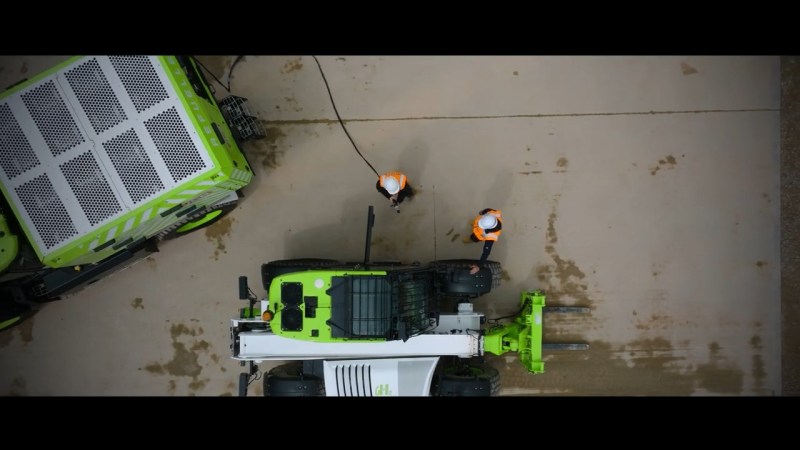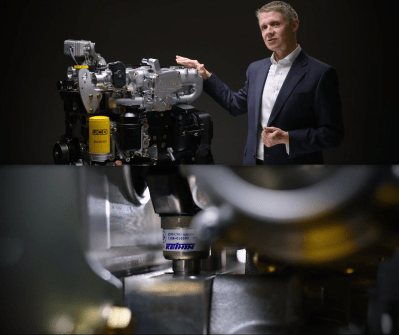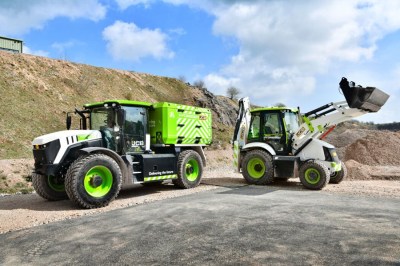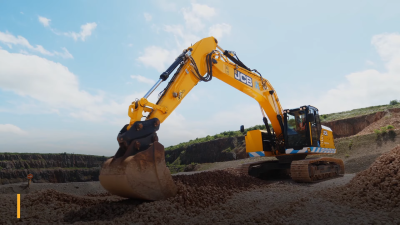JCB Is Exploring Hydrogen Combustion Engines For Construction Machinery

When we think about greening up the planet, solar panels and electric cars are often at the forefront of our mind. However, there’s a whole bunch of other things out there that are spewing out carbon dioxide that also need to be cleaned up. That includes leaf blowers, lawn mowers, and yes – big equipment for construction and agricultural work!
JCB manufactures diesel engines for big machines, but is now looking to switch things up for a cleaner future. To that end, the company is working on hydrogen-burning engines for its big machines.
Burning The Lightest Gas
Hydrogen can be used to produce electricity by passing it through a fuel cell, where it can then be used to power motors. Companies have explored using hydrogen in this manner to power cars and trucks. JCB initially started by looking at hydrogen fuel cells, too, but found they weren’t great at delivering the instantaneous high power needed for construction machinery. Instead, the company began exploring using hydrogen to burn in otherwise fairly conventional combustion engines. It’s a concept that other companies have explored too, with Toyota even looking into the technology with a motorsports program.
Hydrogen is useful as a fuel because its combustion is very clean. In terms of the direct products of the chemical reaction between hydrogen and oxygen, the only byproduct is water. Of course, when burning hydrogen at high temperatures in air, the reaction does cause the production of some oxides of nitrogen. Overall though, the emissions from hydrogen combustion are far cleaner than burning fossil fuels. It’s all down to the absence of carbon, which means the reaction produces zero carbon dioxide.

For this reason, JCB has pursued hydrogen combustion engines as a way to cleanly power its machines. The company has developed a 4.8-liter four-cylinder hydrogen-powered engine. It’s capable of putting out the same power and torque as the company’s similarly-sized Dieselmax 448 engine, and is expected to land at the same cost, too. Plus, there’s even potential to retrofit the cleaner-burning engine to old machines.
To build the hydrogen engine, JCB started with the bottom half of the existing Dieselmax model. The sump and cylinder block are the same as the diesel-powered model, as is the cooling system. The hydrogen engine also still uses a regular variable-geometry turbo. Up top, though, the engine is quite different. There’s a new cylinder head and injection system, designed for injecting hydrogen gas instead of diesel. The engine had to be modified for spark ignition instead of compression ignition, too, as hydrogen is most suited to the former. The diesel fuel tank is similarly gone, replaced with five 1kg storage vessels for hydrogen gas made of aluminium and carbon fiber. .
Notably, hydrogen-burning combustion engine can work in largely the same way as a spark-ignition gasoline engine. Just like a gas engine can be converted to run on liquified petroleum gas, they can be converted to run on hydrogen pretty much just by changing the injectors, albeit at lower power thanks to induction inefficiencies. Designing a direct-injection engine specifically for hydrogen combustion can get around this problem though, and could theoretically produce an engine with 20% more power than a similar-sized gasoline engine. Other modifications to suit hydrogen power, like hardened valves and special spark plugs, help with longevity and to improve the quality of combustion. As for diesel engines, they’re not as simple to convert to hydrogen power, as the gaseous fuel isn’t as suitable for compression ignition. However, as JCB has demonstrated, a hydrogen engine of similar size can match the power and torque of a diesel when built properly, and can even share fundamental components.
JCB’s engine is still in the testing phase. It aims to start pre-production on the engine by the end of 2023, applying to its construction and agricultural vehicles. Meanwhile, as much as hydrogen is cleaner burning than fossil fuels, the technology does still face some hurdles to wider adoption.
Challenges

Hydrogen doesn’t have a viable distribution network yet, either in terms of long-distance pipelines or in terms of filling stations for consumers. To that end, JCB has developed its own mobile refuelling vehicle. For agricultural and construction operators, this fits the bill, as fuel is often taken to machines, rather than vice versa. It’s far less of an issue compared to powering road-going vehicles, which owners expect to be able to drive to a filling station wherever they are.
Producing hydrogen is also a problem. It can be produced cleanly using renewable electricity to split water into hydrogen, producing what is known as “green hydrogen.” However, much hydrogen currently on the market is instead chemically produced from natural gas, releasing harmful carbon emissions and making what is called “grey hydrogen”. Some producers split the difference, storing the carbon emissions to make what is known as “blue hydrogen.” Fundamentally, though, there simply isn’t a major renewable source of “green hydrogen” ready to power hydrogen vehicles yet. Thus, hydrogen vehicles are currently just shifting emissions to the grey hydrogen plants.

The other major problem with hydrogen combustion engines is efficiency. Hydrogen-engined vehicles have a well-to-wheel efficiency of only around 20-25%, which compares poorly to the 25-30% figure for hydrogen fuel cell vehicles. That’s largely down to the greater losses involved in internal combustion engines compared to fuel cells. However, when compared to battery vehicles, the losses are even worse, thanks to all the energy lost in refining and transporting hydrogen fuel. A comparable electric vehicle could have efficiency as high as 80-85% in comparison. In the end, a hydrogen-burning vehicle is roughly as efficient as a diesel-burning one, though with the benefit of having far cleaner emissions.
Looking Ahead
Overall, if the world is to get to a point of net zero carbon emissions, just about every fossil-fuel burning machine will need to be converted to a method of cleaner operation. JCB’s research over the last few years is pursuing exactly that goal, and should be commended.
At the same time, it’s clear that there are more hurdles to clear before the world of construction and agricultural machinery can be said to be fully clean and green. For machines that work heavy jobs for long hours, electric drive may not yet be an option. In those cases, hydrogen combustion could be a viable technology to clean them up in the meantime. However, the production and distribution of cleanly-sourced hydrogen must be there to make the pursuit worthwhile. JCB is holding up its end of the deal, and the supply of hydrogen must catch up to complete the puzzle.
from Blog – Hackaday https://ift.tt/XzMCu5J
Comments
Post a Comment